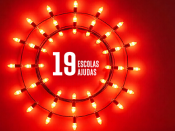Por Sofia Teixeira (Departamento de Informática | Ciências ULisboa).
Understanding how people who commit suicide perceive their cognitive states and emotions represents an important open scientific challenge. We build upon cognitive network science, psycholinguistics and semantic frame theory to introduce a network representation of suicidal ideation as expressed in multiple suicide notes. By reconstructing the knowledge structure of such notes, we reveal interconnections between the ideas and emotional states of people who committed suicide. Our results indicate that connections between positively- and negatively-valenced terms give rise to a degree of balance that is significantly higher than in a null model capturing mind-wandering in absence of suicidal ideation. We show that suicide notes are affectively compartmentalized such that positive concepts tend to cluster together and dominate the overall network structure. Notably, this positive clustering diverges from perceptions of self, which are found to be dominated by negative, sad conceptual associations. A key positive concept is “love”, which integrates information relating the self to others and is semantically prominent across suicide notes. The emotions constituting the semantic frame of “love” combine joy and trust with anticipation and sadness, which can be linked to psychological theories of meaning-making as well as narrative psychology. Our results open new ways for understanding the structure of genuine suicide notes and may be used to inform future research on suicide prevention.
Short Bio: Sofia Teixeira holds a PhD in Information Systems and Computer Engineering from Universidade de Lisboa (Portugal). Currently, she is an Assistant Professor in the Department of Informatics, and LASIGE researcher, at the Faculty of Sciences, University of Lisbon. Previously she was a research scientist at Hospital da Luz Learning Health in Lisbon and postdoc at the Indiana University Network Science Institute. Sofia's research interests include modelling and analyzing complex systems through the development of new algorithms on graphs and the application of network science and machine learning methods. Her fields of interest, among others, are Human Behavior, Computational Social Sciences, Network Medicine, Cognitive Science, Network Neuroscience, and Computational Epidemiology.
















